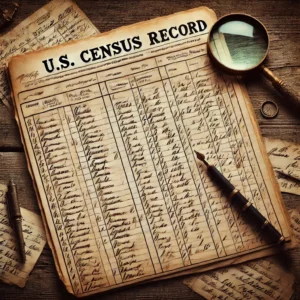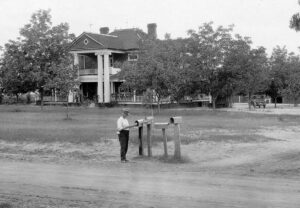Happy New Year from the Orangeburg County Historical Society! As we welcome the promise and opportunity of a brand-new year, we’re reminded of the importance of preserving and exploring our shared histories. For those of us passionate about genealogy and family history research, today, January 1st, serves as a poignant reminder of the enduring value of U.S. Census records in uncovering our roots.

The Census: A Cornerstone of Family History Research
Census records are often the first resource genealogists turn to when piecing together family histories. These decennial snapshots of American households offer invaluable insights into the lives of our ancestors, recording names, ages, relationships, occupations, birthplaces, and more. Each detail provides a thread in the tapestry of a family’s story, helping researchers trace lineage, locate relatives, and understand the context of their ancestors’ lives.
At the Orangeburg County Historical Society, we’ve seen firsthand how census records can illuminate forgotten chapters of local families’ histories. From identifying long-lost relatives to revealing migration patterns, these documents are foundational tools for genealogists and historians alike.
The Role of the American Community Survey
On this first day of the year, some households across the nation may find their mailboxes containing a letter from the U.S. Census Bureau, inviting them to participate in the American Community Survey (ACS). Unlike the decennial census, the ACS collects detailed demographic, social, economic, and housing information on an annual basis. The data it gathers informs critical decisions about infrastructure, education, healthcare, and community development.

While the ACS serves contemporary purposes, it also holds future historical significance. Imagine the value this detailed dataset will have for researchers decades or centuries from now, offering a nuanced view of life in the early 21st century. For genealogists of the future, the ACS will be a treasure trove of information, painting vivid pictures of their ancestors’ lives.
Census Records in Practice: Uncovering Hidden Connections
In our work at the Historical Society, we’ve witnessed countless success stories where census records have been instrumental. For instance, a local family once approached us seeking information about an ancestor they believed to be a Confederate soldier. Through census data, we uncovered not only his military service but also a broader picture of his life: his occupation as a carpenter, his large family, and his eventual migration to another state. These details transformed a vague family legend into a tangible, relatable narrative.
Another memorable case involved piecing together the lineage of a woman searching for her great-grandmother’s story. The 1870 Census—the first to include all individuals by name, following the Civil War—proved vital. It documented her great-grandmother as a young girl in a household of freedpeople, providing the first recorded trace of her existence. From there, we were able to reconstruct a lineage that extended through generations.
The Historical Importance of Participating in Surveys
As genealogists, we often benefit from the records left behind by those who came before us. By participating in surveys like the ACS, we contribute to a legacy of documentation that will aid future researchers in understanding who we are and the world we live in today. These records not only reflect individual lives but also serve as historical artifacts, capturing the essence of their times.
Participation in the ACS is easy, secure, and important. If you receive a letter from the Census Bureau, consider it an opportunity to contribute to history. Every response helps shape a fuller understanding of our nation and its communities.
Tips for Using Census Records in Your Research
If you’re new to genealogy or looking to expand your family tree, here are some tips for effectively using census records:
- Start with What You Know: Begin with the most recent census available and work backward. This approach helps you establish a timeline and confirm known family details.
- Pay Attention to Neighbors: Families often lived near relatives. Check surrounding households for familiar surnames or connections.
- Consider Historical Context: Understanding the time and place of a census can provide clues about your ancestors’ circumstances, such as economic conditions or migration trends.
- Look for Clues in Occupations: A listed occupation might lead you to additional records, such as trade directories or employment histories.
- Verify Information Across Records: Cross-referencing census data with other sources like birth, marriage, and death records ensures accuracy and completeness.
Looking Ahead
As we step into 2025, let’s embrace the spirit of discovery and connection. Whether you’re delving into your family’s past, contributing to community history, or simply answering the call to participate in a national survey, every action we take enriches the historical record.
The Orangeburg County Historical Society is here to support your journey. We offer access to a wealth of resources, including historical documents, archival materials, and expert guidance. If you’re starting or continuing your family history research this year, we encourage you to visit us or explore our online tools.
Let’s make 2025 a year of uncovering stories, building connections, and preserving the legacy of Orangeburg County for generations to come. And if you receive a letter from the Census Bureau today, remember: you’re not just filling out a survey—you’re shaping history.
Happy New Year, and happy researching!

